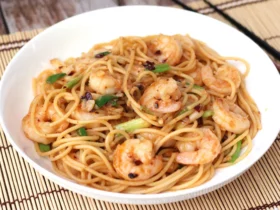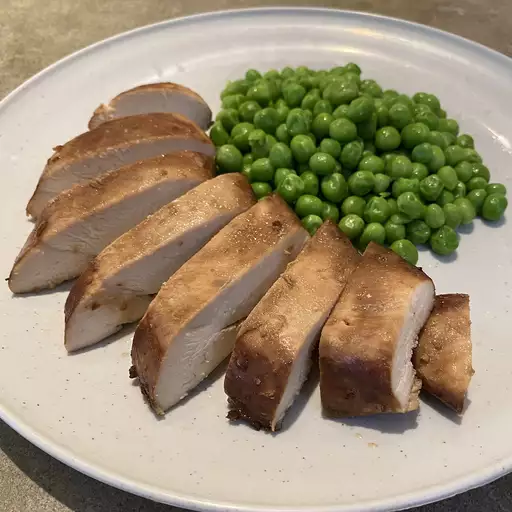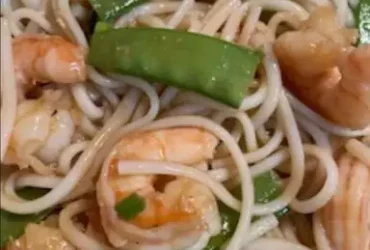Background and History
Orange Soya Sauce Marinated Chicken is a delightful fusion of citrus and savory flavors, combining the tanginess of orange juice with the umami depth of soy sauce. This dish is rooted in Asian culinary traditions, where soy sauce is a staple ingredient, and citrus fruits like oranges are often used to balance flavors. The marinade infuses the chicken with a burst of flavor, making it a popular choice for both casual family dinners and special occasions.
Interesting Facts
- Cultural Fusion: This dish exemplifies the fusion of Asian and Western culinary practices, bringing together the universal appeal of citrus and the rich, salty profile of soy sauce.
- Versatile Preparation: Orange Soya Sauce Marinated Chicken can be grilled, baked, or stir-fried, making it adaptable to various cooking methods.
- Health Benefits: Oranges are rich in vitamin C, which boosts immunity, while soy sauce contains antioxidants that have potential health benefits.
Recipe Instructions
Serves
4 people
Time
- Preparation Time: 10 minutes
- Marinating Time: 2 hours
- Cooking Time: 30 minutes
Cooking Time
30 minutes
Ingredients
- 4 boneless, skinless chicken breasts
- 1 cup fresh orange juice
- 1/4 cup soy sauce
- 2 tablespoons honey
- 2 tablespoons olive oil
- 3 garlic cloves, minced
- 1 teaspoon grated ginger
- 1 teaspoon orange zest
- Salt and pepper to taste
- Optional: sesame seeds and chopped green onions for garnish
Instructions
Prepare the Marinade
In a bowl, combine orange juice, soy sauce, honey, olive oil, minced garlic, grated ginger, and orange zest. Mix well.
Marinate the Chicken
Place the chicken breasts in a resealable plastic bag or a shallow dish. Pour the marinade over the chicken, ensuring each piece is well-coated. Seal the bag or cover the dish and refrigerate for at least 2 hours, preferably overnight for deeper flavor.
Preheat the Oven
If baking, preheat your oven to 375°F (190°C). If grilling, preheat the grill to medium-high heat.
Cook the Chicken
Remove the chicken from the marinade, shaking off any excess. For baking, place the chicken in a baking dish and bake for 25-30 minutes until the chicken is cooked through and reaches an internal temperature of 165°F (74°C). For grilling, cook the chicken on the grill for about 6-7 minutes per side until fully cooked.
Serve
Let the chicken rest for a few minutes before slicing. Garnish with sesame seeds and chopped green onions if desired. Serve with steamed rice or a fresh salad.
Nutrition Facts (Per Serving)
- Calories: 280
- Protein: 28g
- Carbohydrates: 18g
- Fat: 10g
- Fiber: 1g
- Sugar: 12g
- Sodium: 900mg
Notes
- Marinating Time: The longer you marinate the chicken, the more flavorful it will be. However, avoid marinating for more than 24 hours as the citrus can start to break down the meat.
- Alternative Proteins: This marinade also works well with pork chops or tofu for a vegetarian option.
Allergy Warning
- Soy Sauce: Contains soy and wheat (check for gluten-free soy sauce if needed).
- Citrus: Some individuals may have citrus allergies; substitute with apple cider vinegar if necessary.
- Sesame Seeds: If using as a garnish, be aware that sesame is a common allergen.
How long can you marinate chicken in soy sauce?
You can marinate chicken in soy sauce for up to 24 hours. While a minimum of 30 minutes is sufficient to impart some flavor, marinating for several hours or overnight ensures a deeper and more robust taste. However, avoid marinating for more than 24 hours as the soy sauce and other acidic components can start to break down the meat’s texture.
What is the orange chicken sauce made of?
Orange chicken sauce is typically made of fresh orange juice, soy sauce, honey or sugar, garlic, ginger, and a thickening agent like cornstarch. These ingredients combine to create a tangy, sweet, and savory sauce that complements the chicken perfectly.
Does orange chicken contain soy sauce?
Yes, orange chicken usually contains soy sauce as a key ingredient in the sauce. Soy sauce adds a savory depth and enhances the overall flavor profile of the dish.
Why is soya sauce used in chicken?
Soy sauce is used in chicken dishes to provide umami, a savory taste that enhances the overall flavor. It also helps to tenderize the meat and adds a rich, salty note that balances well with other ingredients in the marinade or sauce.
What can I mix with soy sauce?
Soy sauce can be mixed with various ingredients to create different flavors. Common combinations include
- Garlic and ginger for an Asian-inspired marinade.
- Honey or brown sugar for a sweet-savory glaze.
- Citrus juices like orange or lemon for a tangy twist.
- Chili flakes or sriracha for a spicy kick.
- Vinegar and sesame oil for a balanced dipping sauce.
What is soya sauce vs soy sauce?
Soya sauce and soy sauce refer to the same condiment. “Soya” is commonly used in British English, while “soy” is the preferred term in American English. Both terms describe the same fermented soybean-based sauce used in cooking and as a condiment.
Is soy sauce healthy?
Soy sauce can be part of a healthy diet when consumed in moderation. It contains antioxidants and small amounts of essential nutrients. However, it is high in sodium, so it should be used sparingly, especially for those with high blood pressure or sodium sensitivities.
When to add soy sauce?
Soy sauce can be added at various stages of cooking
- In marinades, to infuse flavor before cooking.
- During cooking, to season and add depth to stir-fries, soups, and sauces.
- As a finishing touch, drizzled over cooked dishes to enhance flavor.
- As a dipping sauce for sushi, dumplings, and other appetizers.
What is soy sauce best for?
Soy sauce is best for
- Marinades: Adding depth and umami to meats, fish, and tofu.
- Stir-fries: Enhancing the flavor of vegetables, noodles, and rice.
- Soups and broths: Contributing a savory base.
- Sauces and dressings: Providing a rich, salty element.
- Dipping: Complementing the flavors of sushi, dumplings, and spring rolls.
What are the ingredients in soy sauce?
The primary ingredients in soy sauce are soybeans, wheat, salt, and water. The fermentation process, which involves specific molds, yeasts, and bacteria, contributes to its distinctive flavor and aroma. Some variations may include additional ingredients like sugar or preservatives.
- Best LeadsGorilla Alternatives for 2025 - April 22, 2025
- Best Leadzai Alternatives for 2025 - April 22, 2025
- Best LeadSwift Alternatives for 2025 - April 21, 2025















